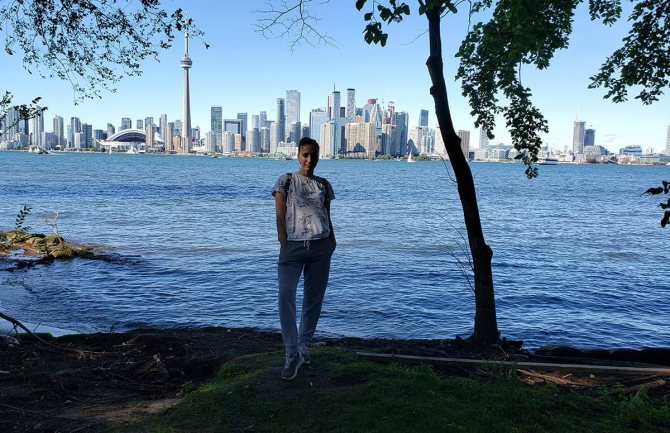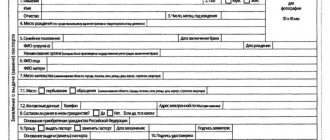Details about emigration to Canada from Russia, Ukraine, Kazakhstan, Belarus and other CIS countries: methods and where to start.
Canada has the most developed immigration system, which consists of several areas. Some of them include several programs. This means that there are a huge number of ways to move for permanent residence to this state.
If you are starting to understand this topic, then carefully study the article and follow the links in the text. They are posted so that you can get the most complete information possible. Our goal is to help you immigrate to Canada.
The requirements of immigration programs are the same for everyone. Therefore, it does not matter where you are from: Russia, Kazakhstan, Ukraine, Belarus or another country - the emigration process is the same. There may be differences in the preparation of documents, but that is another topic.
Moraine is a glacial lake in Banff National Park, Alberta.
Ways to immigrate to Canada
At this stage, it is important to weed out unsuitable options and leave those that potentially allow you to go to live in Canada.
For example, you have no relatives in this state, which means that the option of family immigration is eliminated.
Or, due to age, financial or family circumstances, you do not consider the option of studying in Canada with subsequent immigration - we also cross out this option.
Express Entry System
This is not an immigration method or program, but it is impossible not to talk about the system, since the immigration process often goes through it.
We recommend studying this topic in a separate detailed article: what is Express Entry.
This system selects eligible candidates for Canada online, speeding up the process. Ideally, you can move your family to Canada in 3-4 months.
The selection is carried out in 2 stages:
- Passage to the pool of candidates.
There are 3 federal programs (more about them below). Each has its own requirements for candidates.
To get into the candidate pool (pass the first stage), you must meet at least one.
- Achieving a passing score.
When a profile has been moved to the pool, it is assessed by the CRS system: a certain point is awarded based on age, education, language proficiency, work experience and connections with Canada. You can calculate yours in our calculator.
The higher this value, the greater the chances of receiving an ITA (invitation to immigrate). The goal is to achieve a passing score.
It is difficult to do this without a connection with Canada. To do this you need to be an almost ideal candidate:
Candidate characteristics that lead to a passing Express Entry scoreLevel CLB 9 – almost fluent in the language.
If you got into the pool, but don’t get the passing score, then it’s better to focus on provincial programs.
What to remember
Express Entry is a platform with a huge number of people wishing to travel to Canada, who compete with each other based on points.
To become a participant, you must qualify for at least one federal program.
Federal programs
All of them are connected with the EE system, which was described above. In many cases, these programs provide official immigration to Canada. A separate article about federal programs.
- Federal Skilled Worker.
The most popular because it does not require a connection with Canada (work experience or a job offer).
- Federal Skilled Trades.
For those who have a profession in demand, as well as a qualification certificate (obtained in Canada) or an invitation to work in the state.
- Canadian Experience Class.
For those who have worked in Canada for at least 1 year within the last 3 years.
Selection criteria for these programs
| F.S.W. | FST | CEC | |
| Point system | This program has its own point system. You must score 67 or more | Absent | Absent |
| Language knowledge (English or French) | From CLB 7 for each indicator (speaking, reading, listening, writing) | From CLB 5 for speaking and listening, from 4 CLB for reading and writing | From CLB 7 for level 0 or A professions, from 5 CLB for level B professions |
| Education | Average and above (affects the number of points) | Not required | Not required |
| Profession skill level in NOC | 0, A or B | In-demand level B professions | 0, A or B |
| experience | One year of continuous work in the last 10 years | Two years in the last 5 years | Year in Canada for the last 3 years |
| Job invitation | Not required, but will give extra points | Required for at least a year, or certificate of qualification | Not required |
You can quickly estimate your chances of participating in these programs using our eligibility calculator.
Let's sum it up
The first step of successful immigration is entry into the Express Entry pool. To do this, you need to comply with one of the programs above.
If you are not suitable now, then figure out why and correct this problem. For example, you may need to improve your language skills, increase your work experience, etc.
Provincial programs
There are 10 provinces and 2 territories in Canada that have their own immigration programs. These programs are divided into several more subprograms. Read more about provincial programs.
Each of them has its own conditions for emigration and is aimed at certain groups of candidates.
All of them can be divided into 2 main ones:
- Associated with Express Entry.
To participate in these, you must be in the pool of candidates (create an Express Entry profile and comply with one of the federal programs).
Next, you need to study the relevant provincial programs and choose the one whose selection criteria suit you.
A list of links to provincial pages is available on the official Canadian website (at the end). In the near future we will post all the necessary information about provincial programs on our website.
After choosing a suitable one, you need to submit documents to the appropriate province, they review them and, if successful, send a nomination.
A provincial nomination means your EE profile receives an additional 600 points. After this, you definitely achieve a passing score, and in the near future you will receive an invitation to submit documents for immigration.
- Not affiliated with Express Entry.
The good thing about these programs is that you don't need an EE profile. This means you do not need to comply with one of the federal programs.
In general the process is approximately the same:
- look for a suitable program;
contact the province and send documents for review;
- if successful, you receive a nomination and send the documents to the federal immigration service;
- If successful, you will go to Canada for permanent residence.
The main disadvantage is that documents are submitted in paper form and not online.
Let's sum it up
Provincial nomination is the main option when you have no chance of achieving a passing score in Express Entry.
Provincial programs with federal support
This is a separate type of program. It is in no way associated with Express Entry, federal or provincial programs described above.
We will not describe each in detail on this page. All information on the corresponding links.
At the moment there are 3 programs:
- Atlantic Immigration Program (Atlantic).
A very popular method of immigration to Canada from Russia and other CIS countries. The main reason is the low requirements for the candidate:
- completing school is enough;
age does not matter;
- lack of a point system;
- language level – below average (from 4 CLB);
- It is enough to have one year of work experience in the last 3.
- Rural and Northern.
A new program developed on the basis of the Atlantic one. In general, it is not much different from it - the same low requirements and the main task is to find an employer in one of the participating cities.
- Agri-Food Immigration Pilot.
The program is for those who already have work experience in Canada in one of the suitable professions in the agricultural sector. In addition, you must have an invitation to work.
The main task and the same problem is to find an employer participating in this program.
Let's sum it up
If you have no chance of Express Entry and provincial programs, then you should start looking for an employer for one of these.
Immigration for the self-employed
Self-employed Persons program for those who are freelancers in the field of culture, art and sports.
These professions include: writers, composers, designers, athletes, coaches, artists, announcers, etc. The full list is on the program page at the link above.
Primary requirements:
- in the last 5 years you must have worked for yourself for at least 2 years in one of the suitable professions, or have at least 2 years of experience participating in cultural events / sports at the world level;
- prove that after moving to Canada you will continue to work for yourself, and not for hire, and will be able to benefit the state;
- score at least 35 points out of 100, which are given for education, age, language proficiency, work experience and the ability to adapt. More details here;
- show that you have money to settle in Canada for the first time. A specific amount is not specified, so one of the tasks is to analyze life in the city, calculate all expenses and provide a detailed moving plan to the immigration officer.
Let's sum it up
If you are definitely a freelancer in one of the listed areas, you can prove it and continue to earn good money after moving to Canada, then you should choose this program.
There are few places allocated, but there are many applicants, so with a minimum of 35 points it will be difficult to compete with other participants.
Immigration through training
Benefits of successfully studying in Canada:
- access to provincial programs that target graduates of their universities;
- additional points for the Federal Skilled Worker program (for studies of 2 years or more);
- additional points when calculated by the CRS system (for studies of 1 year or more);
- the opportunity to improve your knowledge of the language, because you will have to communicate in it constantly;
- the opportunity to officially find a job (up to 20 hours a week);
- being in this state, finding an employer is much easier;
And now the main advantage: Post-graduation work permit (PGWP) is the opportunity to work in Canada after successful completion of training.
In this case, the employer does not need to obtain an LMIA (permission to hire foreigners). It is because of this document that it is so difficult to find a job while in Russia or any other country.
Having gained a year of work experience in Canada, you receive the following bonuses:
- meets the Canadian Experience Class program selection criteria. This means that you will definitely be included in the Express Entry pool of candidates;
- additional points when calculated by the CRS system;
- access to provincial programs targeting people who have worked for them;
- Once you have proven yourself to your employer, you can count on an extension of your work contract, which will give you additional CRS points.
The main disadvantages of this method:
- you need a lot of money: on average, a year of study is 12,000 Canadian dollars;
- you need to know English at the IELTS Academic 6.5 level;
- long process: minimum 1 year of study + 1 year of work + 0.5-1 year of the immigration procedure itself;
- It is difficult for people over 28 to obtain a student visa (Study Permit).
Read more on this topic in the article about immigration through training.
Let's sum it up
This method is ideal for young people who have financial resources and are unable to immigrate in any other way.
We have completed the training program, received work experience, and then we return to the point with Express Entry.
Legally moving to Canada for permanent residence - rules for 2021
Moving to Canada for permanent residence is controlled by law, namely by the Ministry of Citizenship and Migration IRCC. Its representative offices are located in all embassies and consulates of the country around the world.
To leave Russia to move to Canada, you must obtain a visa from the embassy. Its type depends on the purpose of the trip (tourist, student, work, visitor or business visa). If the departure is for the purpose of further permanent residence, then an immigrant visa is required.
For those interested in emigrating to Canada, there are seven options. In 2021, more than 160 thousand people moved to Canada, given that the number of quotas for the year is 310 thousand. By next year it is planned to increase the number of quotas for further legal relocation for permanent residence to 340 thousand.
For those wishing to leave their country for Canada, special federal and provincial programs have been created. Immigration consists of certain procedures and conditions that must be met in order to move permanently.
Step-by-step preparation for submitting an application:
- Those moving to Canada undergo a language test. You need to score at least 6 points. Tests for people moving to the country: English. language - IELTS, French - TEF.
- Then the immigrant needs to find out the expert assessment at the embassy of the documents on the education received.
- You will then need to be tested to leave your country in order to legally enter Canada.
- For those moving to Canada to continue living there, registration is required in the Express Entry online system. There you need to enter information about the results of the procedures required by emigration.
- Next, applications are submitted to the embassy or consulate.
Immigration through work
In this case, it is better to start with the main disadvantage - finding a job in Canada while in another country is very problematic. Even if you come on a tourist visa, it will be difficult because Canadian employers need an LMIA to hire foreigners.
Obtaining this document requires a lot of time and money from the employer. Therefore, you must be a very good and sought-after specialist.
What does working in Canada give you:
- access to the Canadian Experience Class program;
- additional CRS points;
- access to provincial programs targeting people who have worked for them;
- Having proven yourself to the employer, you can count on an extension of your work contract, which will give you additional CRS points;
- the opportunity to improve your knowledge of the language, because you will have to communicate in it constantly;
- opportunity to earn money.
Let's sum it up
An excellent way to emigrate, the main disadvantage of which is that it is very difficult to find an employer.
If you were able to find an employer, then return to the point with Express Entry and recalculate your chances (Job Offer gives additional points).
If you pass, you can apply for immigration at the same time as working. If not, then accumulate a year of experience, and then try to check the chances again.
Interview with a Russian girl: moving and life in Toronto
Several years ago, Galya, originally from the Russian Far East, went to study in Canada. And today he already has the status of a permanent resident of this country, and will soon receive a Canadian passport. Galya told her story of moving and about life in Toronto: monthly expenses, social security, work and salaries, and a lot of other useful information.
Tell about yourself.
Hello, my name is Galya, and I come from the Russian Far East, Kamchatka, that same peninsula with brown bears and snowy volcanoes that is much closer to Japan than to Moscow. Now I live in Canada, namely in Toronto, and am engaged in project management and development of my own startup - TipAim. Our team helps Russian-speaking children come to Canada to study. If you are interested in learning more about how you can dramatically change your life by moving to the land of the maple leaf as a student, then you can find out more about us at tipaim.com.
Your story of moving to Toronto.
I have always loved languages and by the age of 20 I could already speak English and French quite well. In addition, my specialty at KamSU University (kamgu.ru) was translation, and I would not have forgiven myself if I had not gone abroad to practice before graduating. Thus, in the summer of 2012, I firmly decided to go abroad to a language school to improve my 2 main foreign languages. The choice fell on Montreal, Canada, because... a year before, I was denied an American visa under the Work & Travel program, and I didn’t want to spend any more of my time in the USA. Besides, where else in North America could you live in a European-style town and practice English and French at the same time?
After 2 months in Quebec's main city, I couldn't stop thinking about all the opportunities Canada could provide me with. Therefore, after consulting with my parents, I set my sights on taking IELTS and enrolling in a Canadian college immediately after graduating from university.
On the evening of September 2, 2013, I flew to Toronto on a student visa and went to lectures the next morning. After studying here for 2 years, I received 2 certificates: International Business & Logistics, which are equivalent to a second higher education in Russia. After a year of working for a Canadian company, I was able to immigrate through the Express Entry program (www.canada.ca/en/immigration-refugees-citizenship/services/immigrate-canada/express-entry.html).
By mid-2021, I received the presidency. The whole process took me about 5 years, but I can say that it was worth it. With a Canadian resident card, you can freely cross the country's borders, and it becomes much easier to travel around the world without hindrance. In general, resident status is no different from citizenship, the only difference is that I cannot vote yet. But 3 years after obtaining residency, you can also get a passport.

Do you miss your homeland?)
My first year of living in Toronto was quite difficult both psychologically and physically. But as soon as I found a part-time job (while I was still a student), new wonderful friends and gradually established my life here, life in Toronto became much richer for me than it was in my hometown. Of course, I still miss my parents, but I go to visit them periodically and hopefully bring them here in the near future. I think my life would have turned out differently if I had stayed in Russia after university. But I'm happy where I am now and what I'm doing now. So I don't have any regrets today.
Canada is one of the most prosperous countries to live in. What does this mean?
- There is high-quality free medicine, world-class education, and a low crime rate.
- The state takes care of pensioners with the help of a stable pension fund.
- All products and goods in Canada undergo strict quality control.
- Local residents are very friendly and law-abiding.
- There is no corruption or discrimination in this country.
It seems to me that all of the above facts are the key criteria for a stable, prosperous state.
Galina, how has living in Toronto changed you?
I think I have changed for the better. I became more confident in myself, I realized what I could achieve and how. My independent adult life began in this country, so it’s already a little difficult for me to imagine how I would build my, for example, career or personal life in Russia. Here no one judges you for the color of your skin or religion. This is a free country with incredible opportunities, whose government is ready to help its residents at every stage of their life, regardless of appearance or political preferences. If you have goals in life and a desire to work towards achieving them, then Canada is the perfect country for you.

Expensive life in Toronto?
I would say that Toronto is not a cheap city. But! Here you can find good quality clothes and products for any budget. As of today (September 2019), the minimum rate per hour of work in the province of Ontario is 15 Canadian dollars (11.31 USD or 724.11 rubles), and the maximum will depend on education and work experience. But in general, I would say that for $2,500 CAD a month (college/university graduate) you will have a good life here, and for $6,000 CAD (manager at a good company) you will have a luxurious life.
For 2,500 Canadian dollars a month (college or university graduate) in Toronto you will have a good life, and for 6,000 Canadian dollars (a manager in a good company) you will have a luxurious life.
My approximate monthly expenses in Toronto:
- housing: 1-room apartment + electric bill = $1,800 (20 minutes by metro to CH Tower)
- Internet: $45
- metro: $145 (metro pass, all buses and trams that will take you anywhere in the city)
- food: $300 + about $100 for trips to restaurants, cafes
- clothes: $200 (this is enough for everything you need)
- entertainment: $200 (movie tickets, trips out of town, picnics, etc.)
On almost all price tags you will not see tax amounts. Therefore, it is always in your mind to add 13% of the total cost. The advantage of taxation is that once a year all Canadian residents submit a personal tax report to the state, and some part of the taxes you paid is returned to you.
Accommodation in Toronto:
- rent of a 1-room apartment: $1500-3000
- purchase: from $450,000 (if you take out a mortgage, you already need to have about 20% of the total amount)
Average cost of utilities per month:
- electricity: $200
- water: $70
- internet $45
Rent a 1-bedroom apartment in Toronto: $1500-3000
More information about prices can be found on this website: www.expatistan.com/cost-of-living/toronto

What jobs can Russians get in Toronto?
The labor market here is very diverse, and everyone has enormous opportunities to find a job to their liking, regardless of nationality. It requires specialists in completely different fields, but, perhaps, one of the most in-demand professions in the province of Ontario is still IT. In other provinces, top specialties may vary.
I can say that in order to get a job in a good company you need to do the following:
- show work experience in your country
- receiving education from a local educational institution will be a great advantage
- attend various events to expand your circle of acquaintances in Canada
- make a high-quality resume
- constantly improve your language skills
What are the salaries in Toronto for Russians?
The minimum wage is currently $15 per hour: 15.5 * 8 hours * 5 days * 4 weeks = 2,480 (1869.20 USD = 119,767.88 rubles). Several years of work experience and, perhaps, 1-2 certificates to improve your qualifications will help increase your salary several times.
The minimum rate per hour of work in the province of Ontario is 15 Canadian dollars (11.31 USD or 724.11 rubles)
Is it possible for a freelancer to move to Canada and live there legally?
You can come on a tourist visa and, for example, make orders for clients from your (!) country for the time specified in your guest/tourist visa.
But to move legally you will need:
- or come to study and then work for at least a year in a profession not lower than level B from the Canadian National Occupational Classification (https://www.canada.ca/en/immigration-refugees-citizenship/services/immigrate-canada/express-entry/eligibility /find-national-occupation-code.html)
- or apply for residency from your country based on work experience
What is the level of Medicine in Toronto?
Medicine here is very good. While you are studying, you use the health insurance provided by your educational institution. Once you graduate from college or university, you receive a work permit and health insurance. a card that allows you to get a huge range of services for free.
Residents under 25 years of age, as well as pensioners, are provided with medications free of charge.
The only negative that I noticed on this topic is that the dental services (filling: $250) and eye doctors are very expensive here (examination: $150), especially if you do not have a good social network. package from your employer.

Is there social security in Canada for immigrants?
If you have already arrived with permanent residence, and for some reason were not able to immediately find a job in Canada, then you will be paid unemployment benefits for some time. Unfortunately, this practice does not apply to international students. In general, in Canada you can find a lot of different centers and organizations that help new arrivals with learning English and French, writing a resume, finding a job, and finding housing. The main thing is to have a desire to achieve your goals, and there are a million ways to achieve them!










